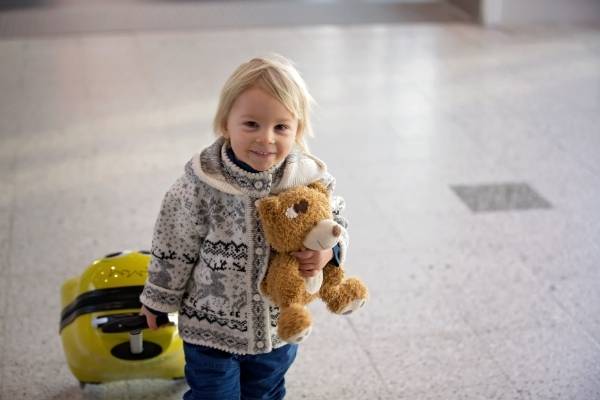Toddler jet lag can be one of the most dreaded travel ailments in the world. No one wants a cranky, overtired toddler, not to mention how hard it is on your little one. If you’re looking for a way to make traveling easier for your child, then these tips might be just what you need to reduce your child’s jet lag symptoms.
In this article, we will go over the symptoms and solutions to jet lag in toddlers and some tips on preventing it from getting too bad. But remember that every kid has different reactions to the changes in travel; it might take a bit of experimenting or tweaking before you find what works for your family.
What is jet lag and how does it affect kids?
Jet Lag, also known as Traveling Sickness, is a type of motion sickness characterized by fatigue, anxiety, disturbances in sleep patterns, and difficulties with concentration. It is the body’s reaction to rapid travel across time zones, and the effects are worsened by factors such as poor sleep habits, chronic illness, environmental stressors, seasonal affective disorder, or lack of light.
The causes of jet lag can be traced to the misalignment of our internal circadian clock with the external environment. Basically, your body thinks it’s daytime if you’re traveling east and nighttime if you’re traveling west. If you have a short flight, jet lag symptoms might only last 24 hours, but if you have a long-haul flight, you might suffer from jet lag for up to three days or even longer.
Symptoms of Jet Lag in Toddlers
- Loss of Appetite
- Slight Confusion
- Irritable and Fussy
- Extra Clingy
- Diarrhea or Constipation
- Early Wakings
- Difficulty Sleeping
There are some factors that make a journey more likely to induce jet lag in kids: unset routines, irregular sleep patterns, lack of exercise, the amount of daylight experienced throughout the day, or being away from home.
How to Avoid Jet Lag

Tips on how you can prevent toddler jet lag and make your journey more fun:
- Pick a family destination that’s close to home. While you might want to go on the ultimate international adventure, toddlers new to airplanes may get overwhelmed by the additional time and distance.
- Put your child on a feeding schedule before you leave for the airport, and be sure to pack plenty of snacks. Please pay attention to how much water your kid is drinking, so they don’t go thirsty during the flight; hydration is key in lessening symptoms.
- Bring along an activity bag with some materials for sensory stimulation and structured playtime. It will make it easier to keep your little one occupied and awake for a bit, so they don’t sleep the whole plane ride.
- Start slightly changing their schedule before the trip so you can ease into the new time zone. If you are traveling from east to west, try getting them earlier and going to bed earlier. If you are traveling from west to east, you might want to keep your child up longer than usual so that they can stay awake later-this may promote a better night’s rest and allow them to sleep later too.
How to Help a Toddler with Jet Lag
While there is no quick fix or cure for Jet Lag, there are some things you can do that will help your toddler get used to it faster. Here are some tips to help you manage a jet-lagged child.
Tips for a toddler with jet lag
1. Abandon the Schedule
If you are with your toddler the next day, don’t try to follow your normal schedule. Yes, it’s tempting to keep them on a schedule, but they will have no idea what time zone they’re in and get confused. Let them go to bed whenever they’re tired and give them naptime whenever they want it.
2. Get Outside
Get your toddler outside as much as possible, even if it’s just for a walk around the block. They will need to be in natural light and get used to all those different sights, smells, and sounds. Sunlight helps the body regulate the hormone melatonin in the body, which helps with sleep.
3. Limit Sugar
Limit your toddler’s intake of sugar. This can all lead to sleep disturbances in children as well as adults. Limit their time watching TV or playing video games for similar reasons (lights are stimulating).
4. Keep It Dark at Night
Your toddler may not want to be in the dark at bedtime. Keep their room as light-free and quiet as possible for a nighttime sleep routine.
5. Give Them Space, but Be There When They Need You
The best thing you can do is give your child space during adjustment periods while also being there when they need you. You’ll need to help them manage their feelings by reassuring them, hugging them, and being patient.
6. Eat Healthy Foods
Eating healthy foods can help keep a toddler’s energy levels up while traveling. Pack favorite snacks and food items, such as cheese sticks, crackers with peanut butter or other nut butter, grapes, raisins, dried apricots, and applesauce cups.
7. Stay Consistent with Bedtime Rituals
Toddlers need to have a bedtime ritual. A routine helps them know when it’s time for sleep and ensures that the body knows what changes in schedules are happening. It will also help them adjust more quickly once they arrive at their destination since jet lag can make getting enough sleep challenging already.
8. Pack a Piece of Home

Pack a favorite toy or blanket to feel at home. This can help comfort them and make the flight seem more familiar when they arrive in their destination country.
9. Keep the Mindset that This too Shall Pass
Jet lag can be a tough world for an adult, but it’s even more challenging for children. Keeping the mindset that this too shall pass is key to helping your little one adjust in their travels and at home when they return.
Tips for Parents During the Trip
It’s easy for parents to get swept up in making sure that their kids are getting the rest they need during travel time, but all of this focusing on your kids can make you forget about your own needs! Here are a few tips to help you get through your trip with jet lag while dealing with helping your little one.
1. Drink water
You must hydrate yourself before, during, and after your trip. Making sure you stay hydrated will help prevent jet lag symptoms in yourself since dehydration can be responsible for headaches, fatigue, and nausea. The fewer symptoms you have, the better equipped you are to help your toddler.
2. Get up early
If possible, try to wake up before everyone else so your body can adjust with the day, even if that means getting less sleep. If you are still feeling tired and your body wants to sleep, don’t fight it and try to nap in the afternoon. Your toddler might benefit from a nap as well.
3. Stay active
Since jet lag can cause you to feel sleepy during the day, but you cannot nap, then get some exercise or do something that you find engaging. This will stimulate your mind and body to wake up and help you stay away from feeling tired the next day. Try not to spend much time sitting around reading a book or watching TV because this can really make us sleepy.
Tips To Help your Toddler After a Trip
When you get home, try to go for walks in the late morning and afternoon so that your child can get some natural light before bedtime-this helps promote better sleeping habits. You might also want to try playing games about when you’re going to sleep to bridge the gap between their internal clock and the local time.
Limit your child’s intake of sugary treats, as this can make it harder for them to sleep at night. You might want to try eating a healthy meal before you go to bed-this helps get your child ready for restful sleep. If possible, keep the lights dim in your house after dark, as this will help your child’s body get used to your current time zone.
When returning home from vacation, don’t forget about getting up earlier than usual if you traveled east to west and staying up later than usual if you traveled west to east. Going for walks in the late morning and afternoon is a great way to get some natural light before bedtime!
FAQs about Jet Lag in Kids
How long does jet lag last in toddlers?
Jet lag usually takes about 1 day for your child to adjust for each time zone crossed. So, it can take as long as a week if you’ve traveled over 8 time zones or more. However, there is no guarantee on how jet lag will affect your child or how fast they can adjust. Be patient and give them time and lots of cuddles.
How do toddlers get rid of jet lag?
Sometimes time is the only thing that can get rid of jet lag. However, some ways can help your toddler deal with jet lag: loosen their schedule, limit sugar, stay active, keep it dark at night, eat healthy meals, be consistent with bedtime rituals, and pack a cuddly stuffy or blanket from home.
Can toddlers take melatonin for jet lag?
Most Pediatricians do not recommend giving your toddler melatonin for jet lag. Melatonin is a hormone that the FDA does not regulate. It could potentially have the reverse effect on your child and make them hyper instead. Children already have a lot of melatonin in their bodies and should not need to take a supplement. For jet lag, it is best to get your toddler back to a normal sleeping schedule naturally.
Note: Always consult a medical professional before giving your child any medication or supplement.
Conclusion
There are several ways to avoid jet lag in kids and steps you can take when your child is experiencing it. The most important thing that parents should do before they get on the plane with their children is to make sure that there’s plenty of time to rest and recover after arriving at their destination. You might also want to bring along an activity bag filled with materials for sensory stimulation or structured playtime so that your toddler doesn’t feel like he’s just sitting around during travel time.
If possible, try not giving them too much sugar while traveling either-this will help promote better sleeping habits once you’re home again. The most important thing that parents should remember is that jet lag doesn’t last long in kids-just a few days after the trip is over, they should be well adjusted to their new sleeping and eating schedule.
Finally, parents must take care of themselves too! Always make sure to take care of your own sleeping, eating, and activity needs as well so that you can stay healthy and strong along with your child through any changes in their routine.



